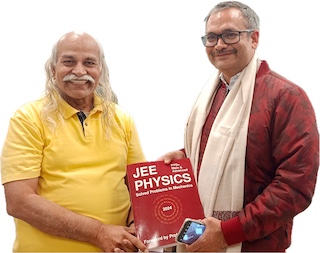Force between two parallel current carrying conductors
When two parallel conductors carry electric currents in the same direction, they will experience a force of attraction towards each other. This force is known as the Ampere force, and it arises from the magnetic fields that the currents produce.
The Ampere force per unit length between two parallel conductors is given by \begin{align} \frac{F}{L} = \frac{\mu_0 I_1 I_2}{2\pi d}, \end{align} where $F$ is the force in Newtons, $I_1$ and $I_2$ are the currents in the two conductors in Amperes, $L$ is the length of the conductors in meters, $d$ is the distance between the conductors in meters, and $\mu_0$ is the permeability of free space.
The SI unit of electric current is Ampere. It is defined as the constant current that, if maintained in two straight parallel conductors of infinite length and negligible cross-section, placed one meter apart in a vacuum, would produce between these conductors a force equal to $2\times10^{-7}$ newtons per meter of length.
